9A Unit3知识点梳理
牛津译林版9AUnit3知识点同步梳理和练习
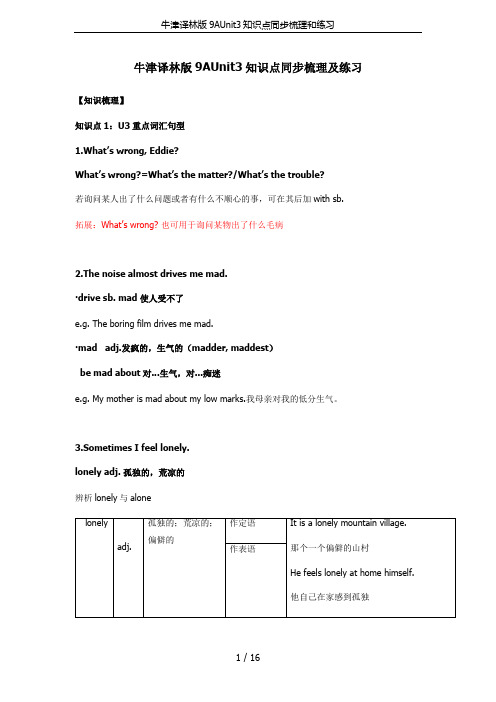
牛津译林版9AUnit3知识点同步梳理及练习【知识梳理】知识点1:U3重点词汇句型1.What’s wrong, Eddie?What’s wrong?=What’s the matter?/What’s the trouble?若询问某人出了什么问题或者有什么不顺心的事,可在其后加with sb.拓展:What’s wrong? 也可用于询问某物出了什么毛病2.The noise almost drives me mad.·drive sb. mad 使人受不了e.g. The boring film drives me mad.·mad adj.发疯的,生气的(madder, maddest)be mad about对...生气,对...痴迷e.g. My mother is mad about my low marks.我母亲对我的低分生气。
3.Sometimes I feel lonely.lonely adj. 孤独的,荒凉的辨析lonely与alone4.Sometimes I feel sleepy in class.sometimes与at times同义辨析:sometimes,some times;sometime与some time5.Perhaps you should manage your time better and go to bed earlier. perhaps adv.,或许,可能e.g. Perhaps it will rain.manage v.合理安排,有效利用(金钱、时间等)e.g. You need to learn to manage your time.你需要合理安排你的时间拓展:manage控制,管理e.g. As a head teacher, he manages a school.作为一名校长,他管理一所学校拓展:manage to do sth.设法做成某事,努力完成某事e.g. He manages to find a place to park his car.他设法找到了一个停车的地方6.I do not know how I should deal with it.deal with处理,对付辨析:deal with 和 do with7. I have no choice but to do it.have no choice but to do sth.别无选择,只能做某事= can do nothing but do sth辨析:but,except与besidesWe all went to the cinema except Tom.He was ill.除了汤姆,我们都去电影院了。
9Aunit3知识点归纳
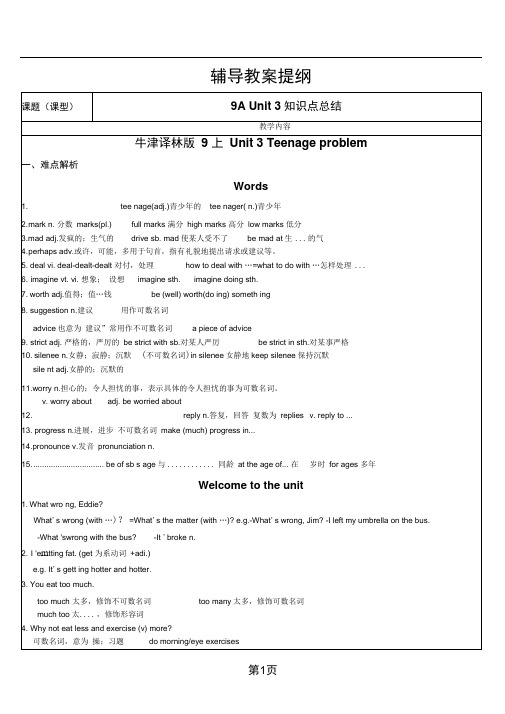
辅导教案提纲e.g. The Summer Palace is worth a visit. 颐和园值得一游。
7. However, my love of football has become the cause of my problem.我对足球的热爱变成了我问题的起因。
cause n. 原因可数名词the cause of…的原因e.g. They are trying to find the cause of the fire.他们试着找到起火的原因。
cause v.引起;造成,可直接跟名词作宾语,也可用于cause sb. / sth. to do sth结构中。
e.g. I ' m not causing you any real trouble, am我对你没有造成真正的麻烦,是吧?What caused Peter to change his pla n?什么引起彼特改变了他的计划?8. I look forward to your valuable advice. valuable adj. 宝贵的,贵重的value n.意为价值;有用性”;e.g. His work has no value. 他的工作没有用。
v.表示珍视,重视”。
e.g. I valued his advice.我重视他的建议。
valuable adj.意为值钱的;有价值的”。
e.g. Is the watch valuable?这表值钱吗?be valuable to sb.对某人有用的9. What about choosing your hobby according to (介词短语,"根据” )the time (先行词)you have(定语从句)?根据你所拥有的时间选择你的爱好怎么样?Grammar1.know, decide, find out, imagine, suggest, wonder, discover, understand, advise 等动词/组后面。
【教育资料】9A unit 3 知识点归纳学习精品

辅导教案提纲课题(课型)9A Unit 3 知识点总结教学内容牛津译林版9上Unit 3 Teenage problem 一、难点解析Words1.teenage(adj.)青少年的teenager(n.)青少年2.mark n. 分数marks(pl.) full marks满分high marks高分low marks 低分3.mad adj.发疯的;生气的drive sb. mad使某人受不了be mad at生……的气4.perhaps adv. 或许,可能,多用于句首,指有礼貌地提出请求或建议等。
5. deal vi. deal-dealt-dealt对付,处理how to deal with…=what to do with…怎样处理……6. imagine vt. vi. 想象;设想imagine sth. imagine doing sth.7. worth adj.值得;值…钱be (well) worth(doing) something8. suggestion n. 建议用作可数名词advice也意为“建议”,常用作不可数名词a piece of advice9.strict adj. 严格的,严厉的be strict with sb. 对某人严厉be strict in sth.对某事严格10. silence n.安静;寂静;沉默(不可数名词) in silence安静地keep silence保持沉默silent adj.安静的;沉默的11.worry n.担心的;令人担忧的事,表示具体的令人担忧的事为可数名词。
v. worry about adj. be worried about12.reply n.答复,回答复数为replies v. reply to ...13. progress n. 进展,进步不可数名词make (much) progress in...14.pronounce v.发音pronunciation n.15.be of sb’s age与……同龄at the age of... 在……岁时for ages 多年Welcome to the unit1. What’s wrong, Eddie?What’s wrong (with…)? =What’s the matter (with…)?e.g.-What’s wrong, Jim? -I left my umbrella on the bus.-What’s wrong with the bus? -It’s broken.2. I’m getting fat. (get为系动词+adj.)e.g. It’s getting hotter and hotter.3. You eat too much.too much 太多,修饰不可数名词too many 太多,修饰可数名词much too 太……,修饰形容词4. Why not eat less and exercise (v.) more?可数名词,意为“操;习题”do morning/eye exercises不可数名词,意为“锻炼” e.g. You can try your best and enjoy the exercise.5. The TV is always on at my home. be on(adv.)意为“开着的”e.g. Don’t leave the lights on.副词on 构成的短语还有turn on; move on; put on6. The noise almost drives me mad.noise n. noisy adj. noisily adv.固定结构drive/make sb. Mad (drive-drove-driven)Reading1.I do not know how I should deal with it. 我不知道我该如何处理它。
牛津9A Unit3知识点
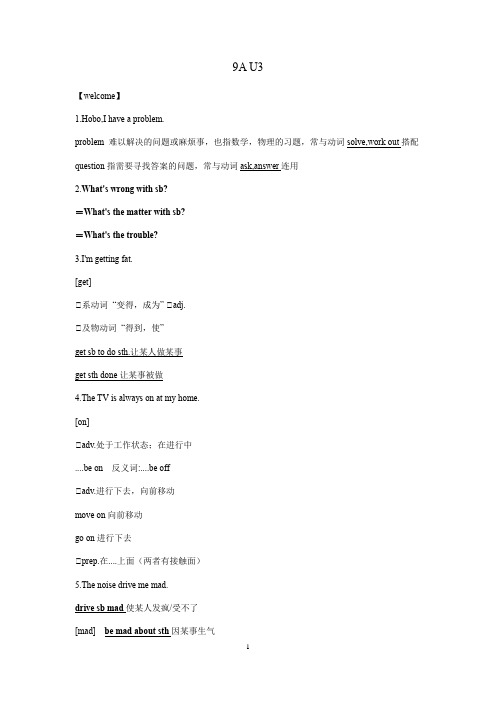
9A U3【welcome】1.Hobo,I have a problem.problem 难以解决的问题或麻烦事,也指数学,物理的习题,常与动词solve,work out搭配question指需要寻找答案的问题,常与动词ask,answer连用2.What's wrong with sb?=What's the matter with sb?=What's the trouble?3.I'm getting fat.[get]①系动词“变得,成为” ①adj.①及物动词“得到,使”get sb to do sth.让某人做某事get sth done让某事被做4.The TV is always on at my home.[on]①adv.处于工作状态;在进行中....be on 反义词:....be off①adv.进行下去,向前移动move on向前移动go on进行下去①prep.在....上面(两者有接触面)5.The noise drive me mad.drive sb mad使某人发疯/受不了[mad] be mad about sth因某事生气be mad at/with sb生某人的气6. sometime 用when提问some time 用how long提问sometimes 用how often提问some times 用how many times提问7.8.get low/high marks得低/高分9.take /do an exam参加考试pass an exam通过考试fail an exam考试不及格10.Perhaps you should manange your time better.[manage]①动词“合理安排,有效使用(金钱、时间等)”manage your time better更好地合理安排你的时间①动词“设法做到” manage to do sth设法做成某事,努力完成某事①动词“控制,管理” 名词:manager 经理,管理者【reading】1.I don't know how I should deal with it.处理,应付deal with和how连用do with和what连用2.I have no choice but to do it.[choice]①不可数名词“选择权,选择的可能性”have no choice but to do sth别无选择只能做某事①可数名词“选择” 动词:chosechose to do sth=make a choice to do sth选择做某事[but]连词①除...之外I have no choice but to leave.►but前无实义动词do/does/did时,but后的不定式要带to Last night I did nothing but watch TV.►but前有实义动词do/does/did时,but后的不定式省略tobut 除...之外;只有but后的词是仅有或存在的内容,通常与no,nothing,nobody等表示否定的词(组)连用except 除…之外(不再有)指从整体排除expect后的人或物,常与all,everybody,everything等词连用besides除…之外(还有)是指在原来的基础上加上besides后的人或物but/except besides②“但是”,表示转折3.stay up熬夜4.Then I sometimes find it hard to stay awake the next day.awake & wakeawakeadj.醒着的be awake醒着vt/vi醒来;唤醒awake sb唤醒某人5.I know it is important to finish all my homework on tome.[time]构成的短语all the time一直from time ti time偶尔,有时at times有时,偶尔at all times随时,总是at a time每次,逐一at the same time同时6.However,I hardly have any spare time for my hobbies like volleyball ans music.[hardly] adv.几乎不➢相当于almost not➢位于连系动词,be动词,助动词或情态动词之后➢实义动词之前➢hardly 为否定副词,出现在反义疑问句中时,后面的附加疑问部分要用肯定式。
9AUnit3知识点

9A Unit3知识点1. Ants have 6 stomach s.2. do eye exercises/ do more exercise/ exercise more3. I don’t get enough sleep.The boy isn’t old enough to dress himself.4. The TV has been on for 3 hours.5. drivesb mad6. I don’t have any close friend to talk to.7. make a lot of noise/ make a big noisenoise---noisy---noisily8. have no communication with sb9. I don’t know what to do with . / I don’t know how to deal with it.10. I have no choice but to do it.I have nothing to but do…choose--- chose---chosen---choice11. stay up late to complete the exercises12. refuse to do …13. hand it in on time14. I hardly have any spare time for my hobbies.I hardly spare ay time for my hobbies.15. be worth doing…16. look forward to doing…17. offer me some suggestions. offersbsth / offer to do …18. be of great value to do…= be very valuable to do …19. be crazy about…20. My dream is to be a football player. (goal, task, job, purpose)21. advice --- advise. advise sb. to do …/ give me some advice22. forget when to stop23. allow sb. to do …/ allow doing…24. get into trouble25. be strict with sb. in sth.26. make our lives more interesting27. I wish I could have my parents’ support. (虚拟语气)28. achieve / keep a balance between my schoolwork and hobbies29. make a list of all the homework you have to do30. work out how much time you need to complete it all31. I hope you think that my advice is worth taking.32. agree with sb. / agree to do… /agree on sth.33. There is always a lot of traffic on the road.34. revise for test35. the last to leave36. There is no need to trouble him.37. He stayed there to see what would happen.38. Linda came home to find her house on fire.39. have no courage to do…40. to tell you the truth = to be honest41. quarrel / argue with …42. need someone to talk to43. To learn dancing well, I need more exercise.44. care only about marks after exams45. turn on/ off/ down/ up46. They know who to talk to and where to get help.47. Talk to your best friend when feeling sad.48. pay attention to doing…. look forward to doing…/ devote … to doing… / help oneself to …49. shout/ laugh/ smile at…50. be proud of… =take pride in …51. She seems much happier than before.. seem to do …/ seem (to be) +adj. / It seems that …52. find sports difficult for her53. reply to my last 3 emails. answer the phone54. That is what friends are for.55. suffer from stress56. in this way/ by the way/ on the way to…57. worry about/ be worried about/ keep worries to onself/ When something worries me, I …58. many students of my age59. One way to solve the problem is to plan your time carefully.60. feel bad about your weight。
译林版英语9A Unit3 知识梳理
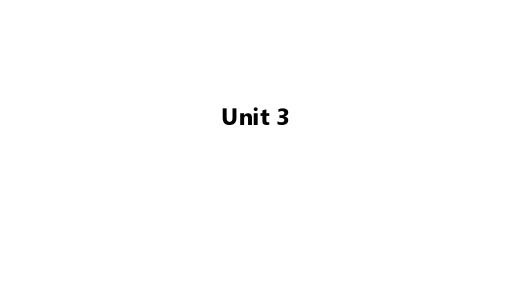
Unit 3词汇拓展1.teenage adj.→ (n.)2.choose v.→ (过去式)→ (过去分词)→ (n.)3.wake v.→ (过去式)→ (过去分词)→ (adj.) 4.value n.→ (adj.)5.worry v.→ (adj.)担心的6.pronounce v.→ (n.)7.correct adj.→ (adv.)8.silent adj.→ (n.)9.reply n.→ (复数) 10.friend n.→ (n.)友谊11.deal v.→ (过去式)→ (过去分词)12.imagine v.→ (n.)13.solve v.→ (n.)解决方法基础自主梳理teenagerchosechosenchoicewokewokenawakevaluableworried/worryingpronunciationcorrectlysilencerepliesfriendshipdealtdealtimaginationsolution短语归纳1. 吃得太多2. 有足够的睡眠3. 有足够的时间做某事4. 使某人发狂5. 熬夜6. 值得做某事7. 待在外面8. 主动给某人提供一些建议9. 使我们的生活更加有趣10. 称某人为书虫11. 在……方面取得进步12. ……的原因13. 在表达某人自己方面有困难14. 与某人同龄15. 保持醒着16. 对某人有价值17. 不客气18. 对付,处理19. 收到某人的来信20. 更好地安排你的时间21. 过多关注分数22. 痴迷于……基础自主梳理get enough sleephave enough time to do sthdrive sb madstay upbe worth doing sthstay outoffer sb some advice/suggestionsmake our lives more interestingcall sb a bookwormthe cause of…have difficulty expressing oneselfof sb’s agestay/keep awakebe of value to sb/be valuable to sb eat too muchmake progress in…don’t mention itdo/deal withhear from sbmanage your time bettercare too much about one’s marksbe crazy about…句型再现1.每天我都有很多家庭作业,我别无选择,只能去做。
9A Unit 3知识点 (教育部审定2013)

9A Unit31.wide adv.充分地;尽可能远地The door was wide open.adj. 宽的The river was so wide that we couldn’t swim across it.2.meal [C] 一顿饭cook meals做饭have meals吃饭Who cook meals in your home?3. share v.分享share …with sb. 与某人分享……Some children don’t like to share their problems.Ann shared her chocolate with the other kids.4.decision n.决定;抉择make/ take a decision 做决定We need to make a decision on this by next Saturday.decide to do sth.决定做某事make a decision to do sth. I decide to go with him.5.help with 帮忙做help do sth.Help sb. with sth. help sb. (to) do sth. 帮助某人做某事I often help him with his maths.=______________________________________6.expect vt.指望;要求be expected to do sth.被要求做某事Her parents expected high standards from her.We’re expected to work on Saturdays.expect vt.期待;盼望;预料,预期,后接名词、代词或动词不定式,不接动名词。
可接that 从句。
He is expecting her letter.I don’t expect that he has done such a thing.7.abroad adv.在国外,到国外,前面不加介词。
9A Unit 3 知识点归纳&练习(附答案)
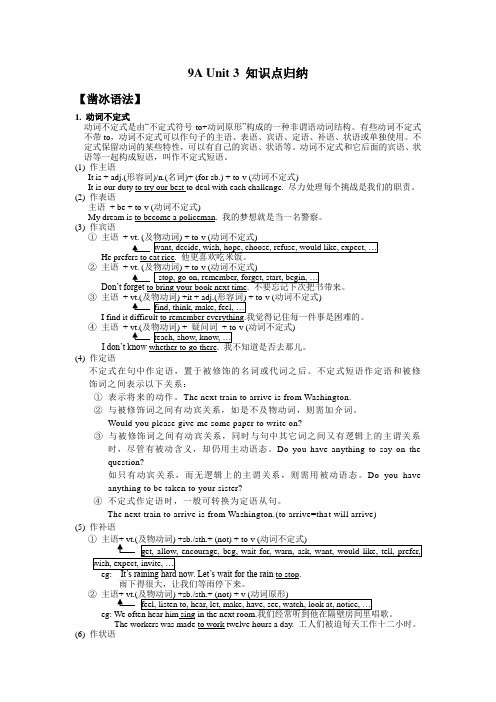
9A Unit 3 知识点归纳【凿冰语法】1. 动词不定式动词不定式是由“不定式符号to+动词原形”构成的一种非谓语动词结构。
有些动词不定式不带to,动词不定式可以作句子的主语、表语、宾语、定语、补语、状语或单独使用。
不定式保留动词的某些特性,可以有自己的宾语、状语等。
动词不定式和它后面的宾语、状语等一起构成短语,叫作不定式短语。
(1) 作主语It is + adj.(形容词)/n.(名词)+ (for sb.) + to-v (动词不定式)It is our duty to try our best to deal with each challenge. 尽力处理每个挑战是我们的职责。
(2) 作表语主语+ be + to-v (动词不定式)My dream is to become a policeman. 我的梦想就是当一名警察。
(3) 作宾语①主语+ vt. (He prefers to eat rice.②主语+ vt. (Don’t forget to bring your book next time.③主语动词不定式)I find it difficult to remember everything.④主语动词不定式)I don’t know whether to go there.(4) 作定语不定式在句中作定语,置于被修饰的名词或代词之后。
不定式短语作定语和被修饰词之间表示以下关系:①表示将来的动作。
The next train to arrive is from Washington.②与被修饰词之间有动宾关系,如是不及物动词,则需加介词。
Would you please give me some paper to write on?③与被修饰词之间有动宾关系,同时与句中其它词之间又有逻辑上的主谓关系时,尽管有被动含义,却仍用主动语态。
Do you have anything to say on the question?如只有动宾关系,而无逻辑上的主谓关系,则需用被动语态。
- 1、下载文档前请自行甄别文档内容的完整性,平台不提供额外的编辑、内容补充、找答案等附加服务。
- 2、"仅部分预览"的文档,不可在线预览部分如存在完整性等问题,可反馈申请退款(可完整预览的文档不适用该条件!)。
- 3、如文档侵犯您的权益,请联系客服反馈,我们会尽快为您处理(人工客服工作时间:9:00-18:30)。
九年级第一学期牛津英语知识点梳理及配套练习
Unit 3 Head to Head
词组
1head to head 针锋相对
2from side to side 从左到右
3grow up 成长;长大
4according to 据(……所说)
5care for 关爱
(=look after / take care of)
6in one’s opinion 依某人的看法
7as a result 因此;结果
8what’s more 而且
9clean out 把(某物)内部彻底打扫干净
10right now 立即;马上
(= immediately / at once / right away / in no time )
11make a complaint 投诉
12(be)wrong with 有问题;有毛病
(=(be) the matter with)
13not only...but(also)…不但…而且…
14allow sb. to do sth. 允许某人做某事
15Sb. be allowed to do sth. 被允许做某事
16pick up 捡起
17learn …from 向…学习
18learn about 了解到关于……
19living things 生物
20create a lot of mess 制造很多垃圾
21bark at sb. 朝某人犬吠
22take sb for a walk 带某人去散步
23all night 彻夜;一整夜
24run free 四处自由走动
25stop …from 阻止…
(=keep…from / provent…from)
26 a small number of 一小部分;少量
27not…but 不是…而是
28make…feel 使…感到
29pay for 支付
重点句型
1.It’s nice to pick them up and hold them in our arms, and it’s wonderful to see them growing
up quickly.
--句中的“It is + 形容词+to do something”这一句型结构意思是“做…是…”
It is interesting to go fishing.
It is difficult to solve this problem in 10 minutes.
--句中的pick up意为“抱起”
He picked up all the books and went away.
The boy picked up the rabbit and took it home.
当有代词出现的时候,代词应放在pick和up之间,如:
Don’t throw away the rubbish. Pick it up.
--句中的see them growing up意为“看着它们长大”。
See有两种常见用法:see somebody do something 和see somebody doing something. 前者常指看到了整个动作过程,动词不定式表示整
个活动或整个事件从头到尾的全过程;而后者表示看到某个正在进行中的活动。
The man saw the robbers leave the hotel.
We can see birds flying along the river.
2.Young people can learn how to care for others and how to respect all living things by keeping
a pet dog.
--句中的how to 是带wh-疑问句的动词不定式,最常用作动词和介词的宾语。
如:
I couldn’t decide which bicycle to buy.
The doctor gave us a talk on how to prevent a cold.
--句中的care for 意为“关爱”。
如:
Ben cared for others more than himself.
Everybody cares for him.
3.This stops their neighbours from getting any sleep.
--句中的stop…from 意为“阻止。
”如:
Nothing will stop us from reaching our aims.
The difficult problems stop us from getting further.
与stop…from结构相似的表达有:prevent…from, keep…from
His illness prevented him from speaking.
Reading books keeps us from getting bored.
4.This may make the dogs feel extremely unhappy.
--句中的make…feel 意为“使。
感到”,这种结构是动词后面跟不带to的不定式。
--句中的feel unhappy意为“感到不高兴”。
Feel 是连系动词,后面跟形容词。
This coat feels soft.
5.Finally, paying for dog food and visiting the vet can be expensive.
--句中的pay for 意为“支付”。
常用的句型结构为:somebody pay money for something,如:
I paid a lot of money for many flat.
Pay…for 可与spend…on 或cost 进行句型转换。
Tina usually spends a lot of money on books.
The ticket for Expo cost me 160 yuan.
语法:
1. 被动语态2
含有情态动词的被动语态的结构:“情态动词+be+动词的过去分词”。
The bicycle can be repaired in three days.
The room must be cleaned before you leave.
Everything should be done before five o’clock.
2.副词
副词是一类用来修饰动词、形容词、其他副词或整个句子的词类。
副词的位置
【注意】副词very可以修饰形容词,但不能修饰动词。
如:I like English very much. 不能用I very like English. 副词enough要放在形容词的后面,形容词enough放在名词前后都可。
如:I don’t know him well enough. / There is enough food for everyone to eat. / There is water enough for children to drink.
副词的同级比较
1.表示A与B在某一方面程度相同时用“as + 副词原形+ as”的句型。
如:Tom can do his homework as fast as his classmates.
汤姆做作业和他的同学们一样快。
We couldn’t imagine that Ben ran as quickly as Michael at school sports meeting.
我们不能想象在校运动会上本跑得和麦克一样快。
2.表示A在某一方面不及B时用“not as/so + 副词原形+ as”的句型。
如:He didn’t come to school as early as his teacher. 他不如老师到校得早。
He did not dig as deep as his colleagues. 他没有同事挖得深。
【注意】not as/so … as的句型可以和含有than的句子相互转换。
如:
Billy didn’t do the work as carefully as Sandy. 可以转换成:
Sandy did the work more carefully than Billy.
易混淆副词的辨析。
